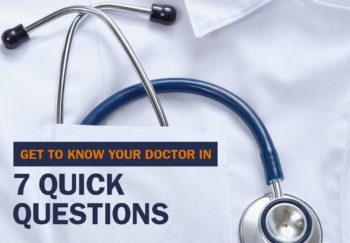No other disease has killed more U.S. residents this year than heart disease. And yet, we know that heart disease is largely preventable and even reversible in some instances. By making heart-smart lifestyle choices and being vigilant about age-appropriate screening, you can help keep your heart healthy for decades to come.
How Old Is Your Heart?
Most people assume that they don’t have to worry about heart disease until at least middle age. It is true that your risk for heart disease increases as you get older. But other risk factors can take a toll on your heart health when you’re younger.
Smoking, high blood pressure, an unhealthy diet, and an inactive lifestyle can actually make your "heart age" greater than your true age. This means you’re at greater risk for heart disease and stroke.
“Heart disease is a progressive disease,” says preventive cardiologist Chris Rembold, MD. “You can start developing hardening of the arteries in your teens or 20s. It’s a lifelong process. But if you do things to prevent heart disease when you’re younger, then you’ll lower your risk.”
Heart Health Tips for All Ages
These lifestyle choices are recommended for most people at every age, not just for heart health, but for overall wellness and disease prevention.
Sit Less, Exercise More
Being inactive is one of the key risk factors for heart disease. Help keep your heart healthy by doing either of these every week (break the minutes up over several days):
- 150 minutes of moderate-intensity physical activity
- 75 minutes of vigorous exercise
Additionally, do muscle-strengthening exercises two days each week.
Eat Smarter
The Mediterranean diet is one of the best heart-healthy diets, according to the American Heart Association. It’s:
- Nutrient-rich
- Low in saturated fat and sodium
- Abundant in vegetables, fruit, whole grains and fish
“The goal is not to lose weight, necessarily, but to protect the arteries,” says Rembold.
Don't Smoke
Every time nicotine enters the body, it constricts the blood vessels. This raises blood pressure and increases the risk for coronary artery disease and stroke. Not to mention that it’s highly addictive. Plus, cigarette smoke itself is a toxic mix of thousands of chemicals that, when inhaled, can damage the heart and blood vessels.
The best thing you can do for your heart is to never start smoking or vaping.
Be Mindful of Your Environment
Research has shown that there’s a strong link between air pollution and heart disease. While some sources of pollution are hard to avoid — traffic or nearby factories — you can control and limit your exposure to others. These include cooking over an open flame indoors or second-hand smoke.
The decisions you make day to day become habits that greatly impact your health over the long term. So start with small changes and keep choosing wisely until healthy comes naturally.
Heart Health Through the Years
You can also take extra steps to stay on top of your heart health and treat any problems before they lead to complications.
Heart Health Tips: In Your 20s
The 20s are all about laying the groundwork for a heart-healthy lifestyle, so set yourself up for success early by exercising and eating right. Get your cholesterol checked, so you’ll have a baseline.
It’s also a good time to educate yourself on your family health history. Talk to your doctor if you have a family history of heart disease or risk factors like:
- High blood pressure
- High cholesterol
You may need closer monitoring.
Heart Health Tips: In Your 30s
As you enter your 30s, metabolism starts to slow down. Without regular exercise and a healthy diet, maintaining a healthy weight can be a challenge. That’s why it’s more important than ever to incorporate healthy habits into your daily routine.
Your 30s are also a good time to make blood pressure checks and cholesterol checks part of a regular checkup with your doctor, according to Rembold.
Heart Health Tips: In Your 40s
Forty may no longer be considered “over the hill.” But it is a time when the body begins experiencing some pretty significant changes, especially when it comes to hormone levels.
Beginning in their late 20s, men’s testosterone levels drop 1-2% per year. Some might begin experiencing problems like erectile dysfunction (ED) by the time they reach 40. If you’ve taken steps to keep your heart healthy and your blood pressure in check, you’re less likely to have this problem.
Guys go to the doctor for ED because they want it fixed. But “generally what we tell them is problems in the bedroom can be one of the earliest signs of heart disease,” says urologist Ryan Smith, MD.
Women, meanwhile, often enter perimenopause in the forties due to a drop in estrogen levels. This results in some not-so-fun side effects like night sweats and migraines. But it may also contribute to sleep problems. According to the National Sleep Foundation, 61% of perimenopausal and postmenopausal women report frequent bouts of insomnia, which has been linked to high blood pressure and heart disease. That’s why it’s important to adopt strategies to ensure you get a good night's sleep.
In addition, be sure to stay on top of your blood pressure and cholesterol levels by continuing your regular screenings. Talk to your doctor about seeing a cardiologist if you have any symptoms of heart disease. These include
- Uncontrolled high blood pressure (hypertension)
- Elevated LDL cholesterol
Heart Health Tips: In Your 50s and Beyond
The average age for heart attack in the U.S. is 65, so this is prime time to pay close attention to your cardiovascular health. “By the time they reach their fifties, around half of all men have plaque buildup in the arteries. Half of all women have plaque in the arteries by their mid-sixties,” says Rembold.
Does Heart Disease Run
In Your Family?
Make an appointment today with a UVA Health preventive cardiologist.
Educate yourself on the signs of heart attack. See a doctor immediately if you experience:
- Pain or tightness in the chest
- Shortness of breath
- Sweating
- Feeling unwell with exertion
- Arm and/or jaw pain
Keeping your heart healthy as you age requires staying motivated and making smart lifestyle choices. And if you’ve been diagnosed with high blood pressure or high cholesterol, managing these conditions is imperative to prevent future cardiovascular complications. This includes taking all medications as prescribed.


